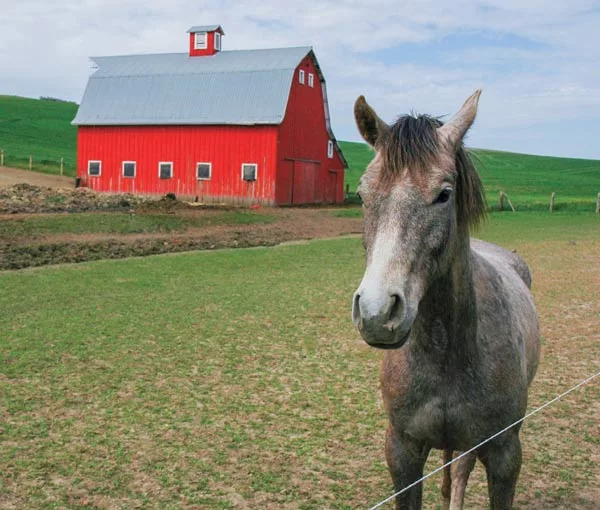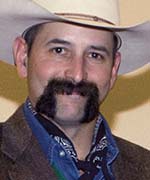Pictured Above: The 2016 American Farriers Journal Business Practices Survey shows that 92% of United States farriers shoe backyard horses.
As you embark on this remarkable career, it is likely you will shoe horses commonly referred to as “backyard horses.” Some will say this with disdain, but in reality, this segment of the horse population may be the very best kind of horses to be shod — especially in this economy.
Most of these horses live on small acreages (backyards) and are members of a family. They are used for pleasure and companionship, but not for work or show. Being this type of horse puts the animal in a category where its value may not be easily represented in dollars. As a family member, their value is based on the family union instead of what the horse could bring in an auction. I find that at barns, you can be viewed as a laborer, although a skilled one.
With any type, style, discipline or population of horses, you can make a list of pros and cons concerning that market. Writing these down will give you an idea if you want to shoe that type of horse. I’ve worked on more than the average share of backyard horses — many that I reminisce about with mainly good memories.
The Pluses
Working relationships. One of the great things about working with backyard horses is the close relationship you can develop with owners. Often, you will get to know them on a personal level. You will be on a first-name basis, instead of being as a glorified groomer or laborer. Customers find out about your life and you learn about their lives.
Loyalty. When customers get to know you, it can add to their loyalty. Backyard owners can become fiercely devoted to you as a shoer because you provide top-notch service to their family member. They will defend you to other horse owners and farriers. Loyalty is a terrific trait because it often results in long-term customers.
Backyard clients may not apply the pressure that some breeds and disciplines may place on farriers.
There are some negatives when working with backyard clients, such as poor conditions that may be unsafe.
Backyard horse owners often base their farrier hiring on factors other than ability to trim and shoe the animal.
Companion animals are family members. Backyard horses become family members. Their owners often spend exorbitant amounts of money on their horses. When a horse is a family member and not viewed as a business investment, that backyard horse will often be higher on the economic priority list than it may be for someone who owns a horse that has a “job.”
Diversify your accounts. Your practice could be devastated should you lose a barn where you have 40 or 50 horses. Don’t have all of your eggs in one basket. If you lose an account with two backyard horses, it is easier to manage and replace that lost income.
In addition, having many customers means you have many opportunities to market products and other services, increasing your income potential.
One of the reasons I got into this industry is the freedom it offers. If you have many horses at one barn, you can almost become an employee of that client rather than thinking of yourself as an independent contractor. You may have to tolerate some things that you wouldn’t if that client only had one horse.
Backyard clients may not apply the pressure that some breeds and disciplines may place on farriers …
Your comfort. If a customer gets to know a great deal about you, they are more likely to provide special items for your comfort when you visit. Backyard clients care about your needs, such as thirst or hunger. It may not seem like much, but on those days when you are shoeing so much that you don’t have time to stop for lunch, a snack or cold drink is a lifesaver. Your visits are infrequent, so the customer is more likely to do things that you appreciate.
Less stress. Even though the horse means a lot to a customer, if a set value had to be established, it is often less than a show horse. This reduces the potential for costly litigation if something happens. Also, backyard horses do not often get too far from home, making customer service easier to provide in both time and money.
Networking. A larger pool of customers provides potential connections. Since you will see more people, you have the opportunity to network in a lot of different areas of your community.
You’ll find customers are involved in a lot of businesses beyond horse business. Working with these clients allows you to have connections in many places.
The Minuses
Now, let’s have a look at the potential cons. As with any pleasure, there has to be pain. Here is what I found to be the down side of doing backyard horses.
Excessive driving. It is convenient when you have a big barn on your books. You can schedule several shoeings for one stop. But with backyard horses, you may have a lot of driving if you need to visit six or more clients in one day.
Backyard horses can live all over the place, and you may find that you are working all over the place as well. Since you are only doing a few horses per stop, you may have several stops to drive to each day.
Socially uncomfortable. While it can be advantageous for backyard horse owners to know you socially, it can create some difficulties should you become friends. This can put you in a situation that is more social than professional. Remember, it is hard to raise your prices on your friends.Text.
Our job as farriers isn’t to make the horse affordable for the client. Remember, a farrier has never forced a client to buy a horse. If you keep your business separate from your personal life, you’ll be much happier.
No champions. If your aspirations are to work with high-level champion horses, you likely won’t find any with backyard accounts. Since the backyard horses are generally not show horses, they also aren’t high-level horses. If your shoeing books only feature backyards, you may not have the time or contacts that will help you eventually break into high-end markets.
There are some negatives when working with backyard clients, such as poor conditions that may be unsafe …
Professionals work at the champion barns, so they have a groom who will fetch the horse or have it ready for you to work with. With backyards, you may have to spend a fair amount of time catching the horse. Make sure you have the mentality to work with these horses.
Poor facilities. Since most backyards are more suitable for barbecues than the practice of farriery, you may lack suitable shoeing facilities. Most barns have better shoeing facilities, from a hard-surface floor to have the horse stand on or to provide shelter from the elements.
The lack of quality facilities can present not only uncomfortable, but dangerous situations for the shoer. Think about where to park and where to shoe — never forget your safety.
Also, the owner may lack horsemanship skills, which could put you in a bad spot if they are holding the horse.
Backyard horse owners are more likely to hire a farrier based on criteria other than shoeing skills. They hire because they like you as a person first, as a farrier second. This can make it possible for a person to have a great business, even if their technical skills are not the best.
However, if you add top-notch skills to running a business that caters to backyard owners, you can generate a good livelihood. It is possible to have a long, satisfying and prosperous career shoeing this sector of the equine market.
These horses have feet, their owners have money, and they deserve and need competent farriery. You may find that you want to be the person to serve this important niche.








